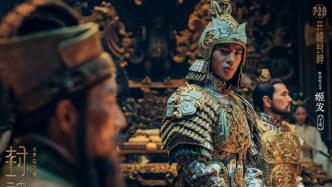
Note: This article contains spoilers
After watching the screening of "Fengshen Part I: Chaoge Fengyun" (hereinafter referred to as "Fengshen Part I") for the first time, the excitement in my heart when I walked out of the cinema was difficult to calm down for a long time. This is indeed a long-lost costume blockbuster. It presents magnificent and magnificent scenes and big productions with a high level of industrialization, making people feel the charm of blockbusters again.
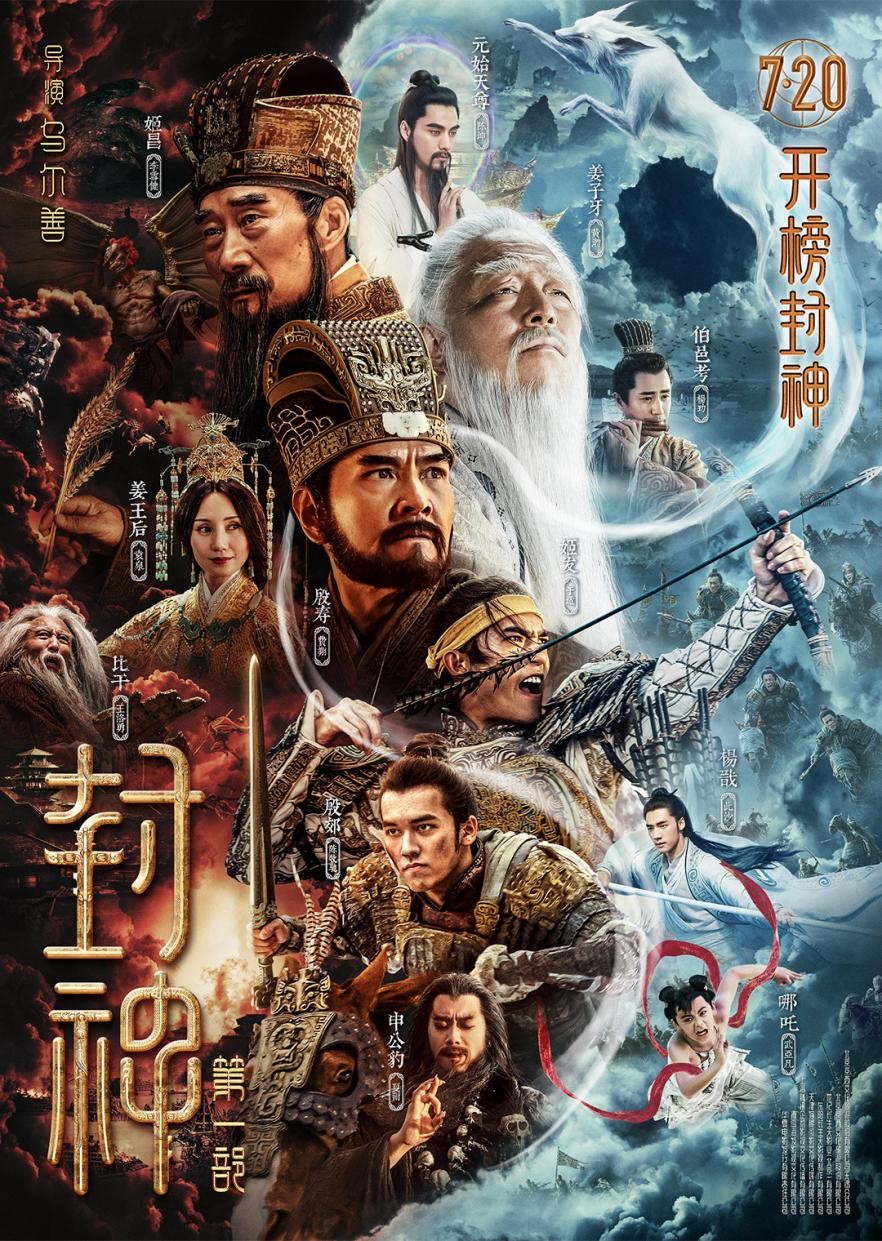
"Fengshen Part I" poster
But the "literary drama" of this movie is even more brilliant. It is reported that the scriptwriting team spent four or five years before and after the creation of the script. Years of polishing have indeed made it the most "modern" story of the gods so far. With the appropriate "new story rewriting", this ancient national legend on the big screen appears both familiar and novel.
As an ancient myth and legend that has been passed down for three thousand years, many people have learned some stories about "Fengshen" through various media and channels. The story of "Fengshen" interpreted by later generations is basically based on the Song and Yuan Dynasties The storybook "Wu Wang's Fighting Zhou Ping Hua", and the Ming Dynasty novel of gods and demons "Feng Shen Yan Yi". "Fengshen Yanyi" has become the source of a series of "Fengshen" film and television creations since the 1990s.
It is not only the age in which the myth is told that matters, but also the age in which the myth is told. Different eras have different speeches on the story of "Fengshen". This ancient myth needs to be retold by today's people.
This is the first question: why is a new narrative needed? Because the core of the ancient legend has long been "outdated".
Peeling off the shell of the novel of gods and demons, "Fengshen Yanyi" actually tells the story of King Wu's defeat of Zhou. Because of King Zhou's licentiousness and brutal rule, King Wu rallied the princes to attack the Shang Dynasty. In the end, King Zhou was defeated and set himself on fire in the battle of Chaoge, and the Zhou Dynasty replaced the Shang Dynasty.

King Yin Shou (Fei Xiang)
On the basis of this legend, the creators of the Ming Dynasty infused it with the color of "myth", mixed with the struggle of the three religions of human education, interpretation of education, and interception of education. spell. Because the Three Religions want to set up a "Fengshen List", just taking advantage of the opportunity of King Wu's overthrow of Zhou and causing a large number of casualties, they arranged a place for those who died, from King Zhou, the king of all evil, to the humble woman who detested Jiang Ziya. Regardless of whether the character is good or bad, everyone can enter the "Fengshen List" and obtain positions of great or small importance. Such "no distinction between good and evil" naturally makes good and evil invisible.
Therefore, as Mr. Lu Xun commented, "The Romance of the Gods" "seems to be aimed at acting history, but it talks about gods and monsters, and it is fabricated. It is empty, and Fang Xiyou is inferior to its grandeur, so so far there has been no one who has regarded it with the feet of a tripod." From the perspective of ideological level, the style of the novel is not high.
"Fengshen Part One" needs to change the framework of the whole story, especially the relationship between King Wu's defeat of Zhou and the "Fengshen Bang". The handling of the movie is quite reasonable. "The First Part of Conferred Gods" sets the "Conferred Gods List" as a treasure left by Nuwa. In the troubled times of "the big business is about to perish", Jiang Ziya brings the "Conferred Gods List" to the world, and only the "Lord of the World" can open it. Conferred on the list of gods and saved the common people. But, who is qualified to be the "co-lord of the world"? Due to the great magic power of the Gods List, the good and evil camps want it for different purposes, and the struggle between the three religions is reasonably woven into the story.
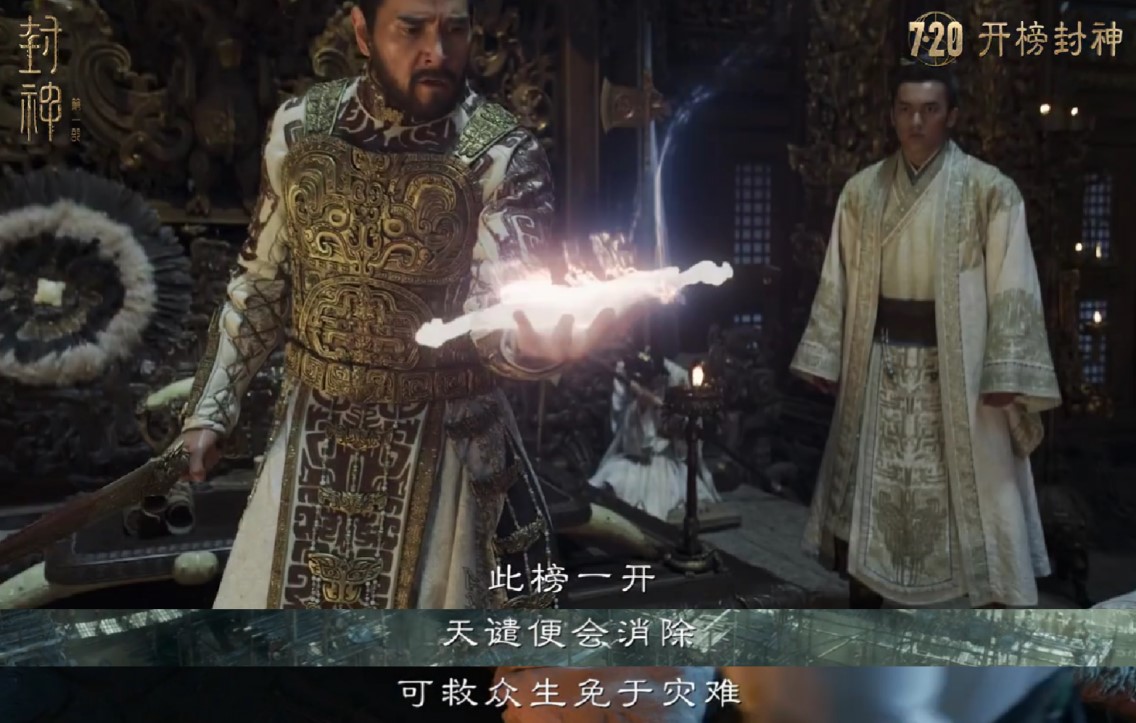
The script changed the setting of "Fengshen Bang"
Although the setting has been changed, the "Trilogy" of "Fengshen" basically fits the story rhythm of "Fengshen Yanyi". Chapters 1 to 33 of "Fengshen Yanyi" talk about King Zhou's innocence and princes' songs against the court, which constitutes the story of "Fengshen Part I"; the second part of the movie includes chapters 34 to 66, and the theme is Xiqi The battle of defense; the third part is chapters 67 to 100, talking about Jiang Ziya's golden platform worshiping the commander, King Wu defeating Zhou, and enshrining the gods in the world.
So far, we can also understand the two major characteristics of "Fengshen Part One". First, it is more inclined to a historical legend of power struggles, focusing on explaining the motives of King Wu's defeat of Zhou; There will not be too much space occupied by various gods and spells, and perhaps the second part will be more mythological.
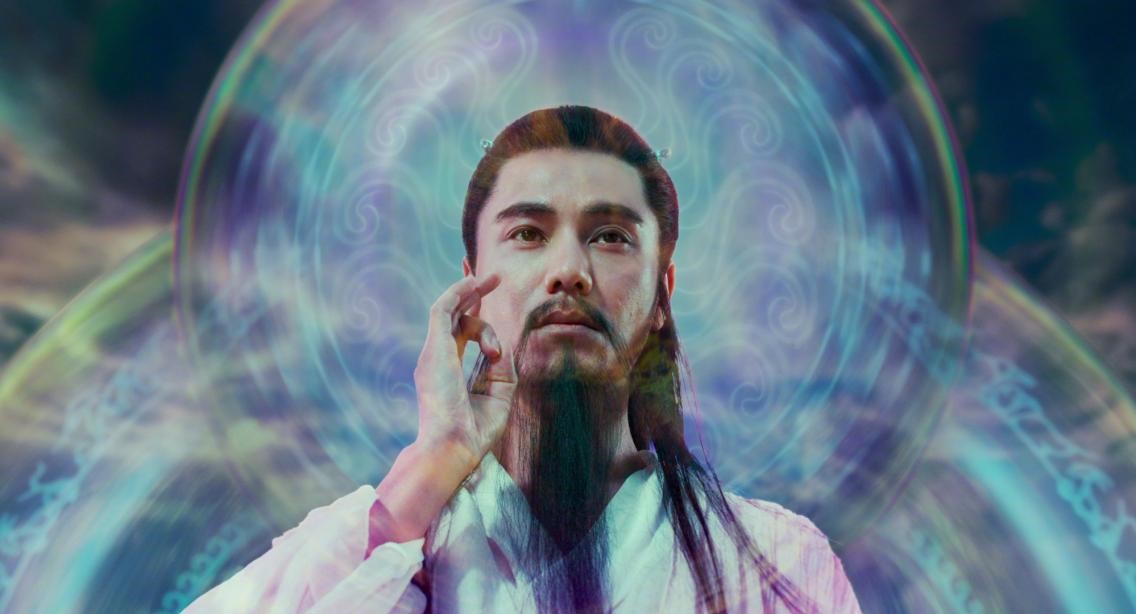
Yuanshi Tianzun (played by Chen Kun), the leader of the interpretation of religion. But in the first part, the color of gods and demons is relatively light, and there are very few scenes in the fairy world
After seeing "Fengshen Part I" as a historical legend of "How King Wu defeated Zhou", the challenge faced by the screenwriters was to explain clearly and forcefully to the audience that Ji Chang (later "King Wen of Zhou"), Ji Fa (Later "King Wu of Zhou") Why did he not hesitate to break through the ethics of monarchs and ministers to oppose King Zhou?

Ji Chang, played by Li Xuejian, is the god of the movie
First of all, it is not difficult to imagine that Yin Shou (played by Fei Xiang), the king of Zhou, is a tyrant.
The surprise of the movie is that Fei Xiang was invited to play King Zhou. "Historical Records" describes King Zhou in this way, "Emperor Zhou is quick to distinguish diseases, and he is very keen in hearing and seeing; he has extraordinary talents and fierce hands." King Zhou is a tyrant and indeed a magnificent man. Fei Xiang's role is very reasonable. "Historical Records" went on to comment, "Good wine and lewd pleasures are indulged in women", "heavy taxes are used to earn the money from the deer platform, and the millet from the huge bridge" "use the wine as a pool, and the county meat as a forest, so that men and women are naked In the meantime, for the drink of the long night, the people complain and hope but the princes have the side"... The movie is very restrained in the portrayal of "the wine pool and meat forest", and more magnifies the ambition, cruelty and violence of King Zhou.
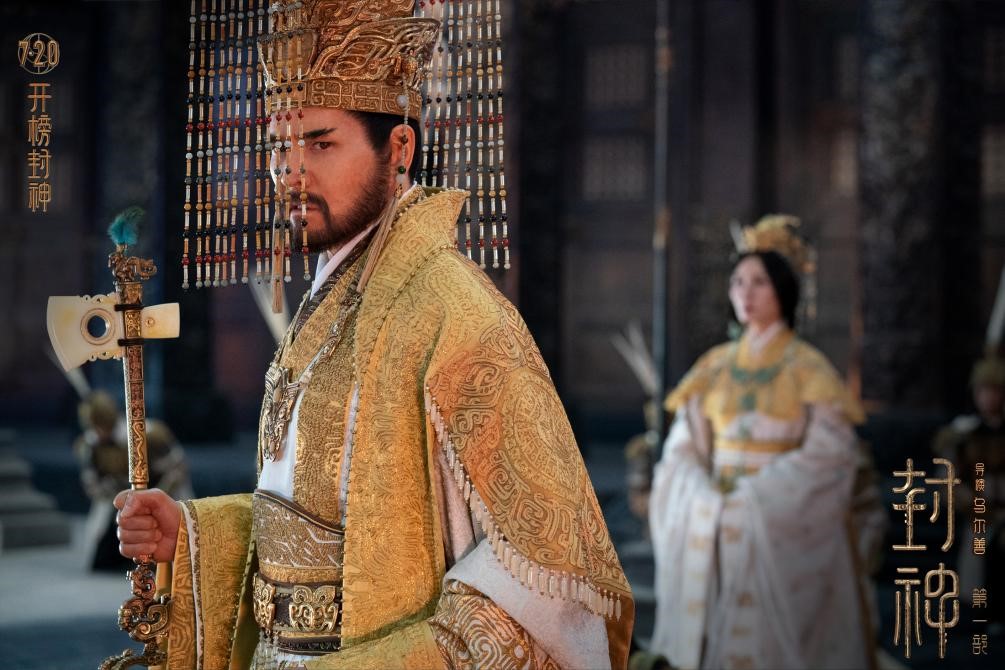
Fei Xiang played the role of King Zhou, bringing a big surprise
But King Zhou concealed all this very well for a time, which made him a person full of personality and charm in the early stage of the film (especially Fei Xiang is so handsome), whether it is his son Yin Jiao (played by Chen Muchi), or in the Shang Dynasty Ji Fa (played by Yu Shi), who is the proton, is full of admiration and worship for King Zhou. This allowed King Zhou to break away from the stereotyped image of a tyrant as "ignorant and brain-dead". On the contrary, he is a master of PUA because of his scheming.
The film rewrites the image of King Zhou, which naturally also affects the portrayal of Su Daji (played by Na Ran).
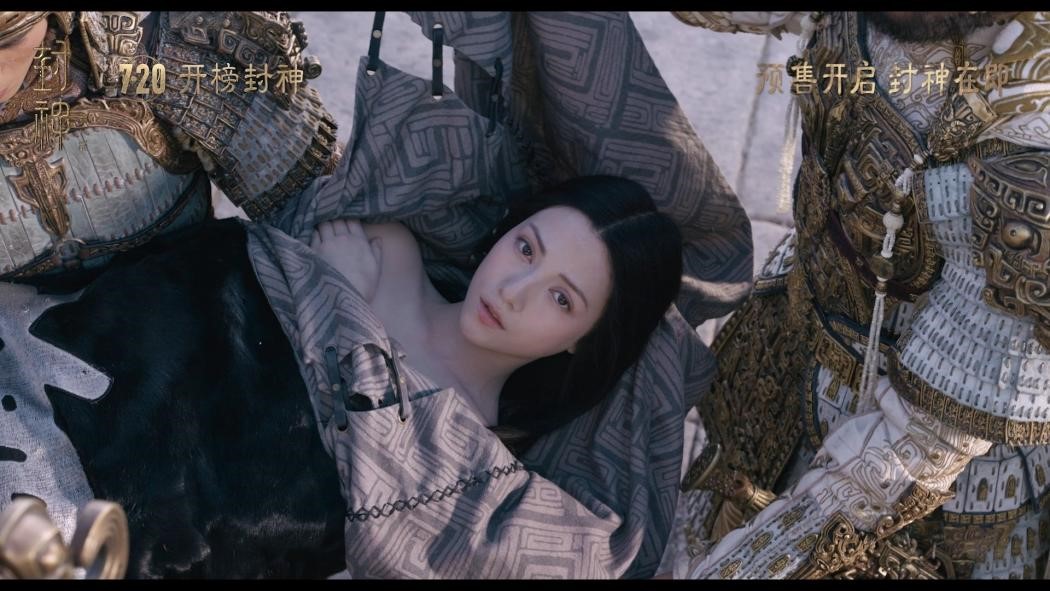
Su Daji (Naran)
In the traditional impression, Su Daji is a "beautiful woman who is a disaster" and "helps the tyrant to abuse". Because King Zhou was bewitched by Su Daji, he became a tyrant. "Fengshen Yanyi" has been rewritten to some extent. Su Daji was possessed by a thousand-year-old fox spirit and was ordered by Nuwa to bring chaos to Yin and Shang. That's why King Zhou became so ruthless. These are the creation of female images full of patriarchal thinking. Lu Xun made precise complaints through the mouth of Ah Q, "Most Chinese men could have been sages, but unfortunately they were all destroyed by women. Shang was killed by Daji." ; Zhou was spoiled by Baosi; Qin... Although there is no clear history, we also assume that he is because of a woman, so it may not be very wrong."
As a current story, if the movie still depicts Su Daji from the perspective of a confidante, it will definitely be met with a backlash from female audiences. The screenwriting team neither tried too hard, such as portraying Su Daji as an ancient feminist in order to please female audiences; nor did they go conservative. Su Daji in the movie not only retains the setting of the fox demon in "Fengshen Yanyi", but her relationship with King Zhou is not a simple "temptation and temptation" relationship, but a "seduction-use" relationship. Wang Mingming knew that Su Daji was possessed by a fox demon, but in order to realize his power ambitions, he was willing to be tempted. He was using the power of the fox demon to consolidate power. Through the mouth of Jiang Ziya (played by Huang Bo), the film says, "There is no such thing as good or bad, only people call, with evil thoughts in their hearts, and evildoers come from their own way", completely negating the logic of "beautiful women are troublesome".

From left to right are Nezha, Jiang Ziya and Yang Jian
But if it is only because King Zhou is a tyrant, from the perspective of feudal ethics, it may still not be able to fully explain the legitimacy of "subjects defeating the king". Screenwriters can of course be "lazy"-because modern audiences can easily interpret this logic from a modern perspective-you are a tyrant, so I oppose you. But in fact, the ancients had a lot of controversy about King Wu's defeat of Zhou, including the attitude of "Fengshen Yanyi" itself was also ambiguous.
Because in the ancient "monarch and minister" system, "subjects beat the emperor" was not allowed, and the ministers could only submit to the king, "the king wants the minister to die, and the minister has to die." Even if the courtier meets a faint king, what the courtier can do is to advise. For example, "Fengshen Yanyi" itself wrote, "I heard that: the father of the emperor has made mistakes, and those who are ministers must endure twists and turns and remonstrate with them, so as to lead their ruler to be in power; The wrath of the father, whether by death, humiliation, or silence, will never lose the reputation of a loyal minister and filial son. He who has never heard of a tyrant's fault and praises his father's evil is still called a minister."
Of course, there was another school among the ancients, such as Mencius, who believed that it was reasonable for "subjects to defeat the emperor". King Xuan of Qi asked: "Tang Fang Jie, and King Wu defeated Zhou, are there any?" Mencius said to him: "There are rumors." He said: "Is it possible for a minister to kill his lord?" He said: "A thief who is benevolent is called a thief. Those who are thieves and righteous are called cruel. Those who are cruel and thieves are called husbands. It is said that a man is punished, but he is not heard of killing a king."
Mencius has changed the concept here. The tyrant is no longer a king, but a "remnant thief". This kind of statement sounds very relieved today, but the ancients lived under the system of "monarch, minister, father, son and son". Many people disagree with Mencius. For example, Su Shi's "On the King of Wu" said, "The King of Wu is not a saint." Also", he also criticized Mencius, "Meng Ke started to make chaos... It is natural that scholars regard Tang and Wu as the righteousness of sages. If they are taken for granted, they are all sinners of Confucius."
In order to solve this feudal ethical paradox, "Fengshen Yanyi" had to use "destiny" as an excuse. Therefore, the logical order of the novel is not that King Zhou was brutal, so he was to be defeated; but because the Shang Dynasty was about to perish in the destiny, Nuwa asked Daji to confuse King Zhou, and then King Wu defeated Zhou.
Surprisingly, "Feng Shen No. 1" actually helped the ancients solve this problem. The "father-son" relationship is the key word to understand the movie, and the screenwriter deconstructs the "monarch-subject" relationship from the "father-son" relationship, which consolidates the rationality of "the minister defeating the emperor".
The film originally created the setting of "proton", "East, west, north, south, and eight hundred princes each sent their sons to pay tribute to the big merchants as protons. If the princes dare to rebel, they will kill the proton first, and then the family will destroy it." Proton It was the bargaining chip for the Yin merchants to hold the princes hostage.
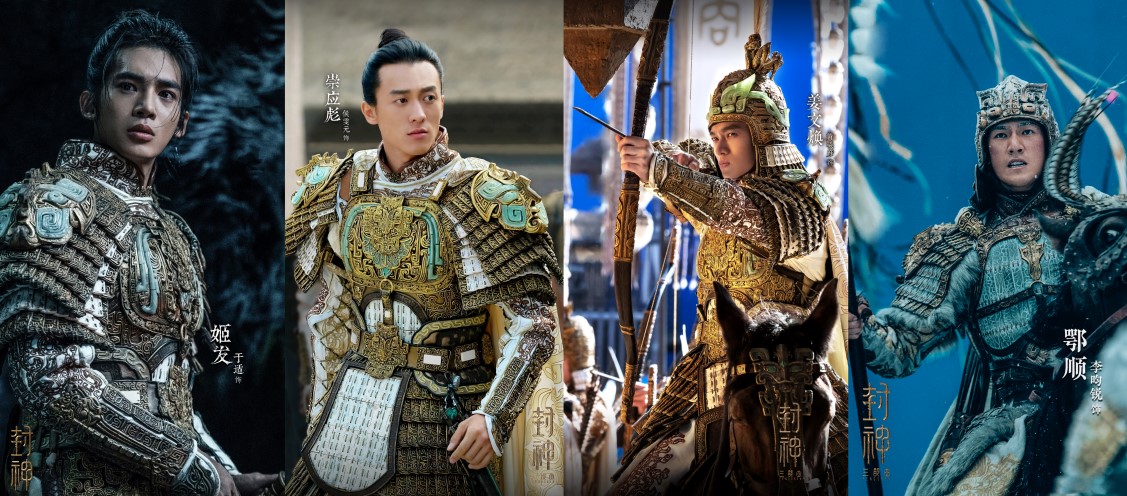
four protons
Therefore, there are two layers of "father-son" relationship in the movie. The first level of father-son relationship is naturally the relationship between the four protons and their biological fathers. The second layer is the relationship between King Zhou and his protons, including the sons of the four great princes, Ji Fa, Chong Yingbiao, Jiang Wenhuan, and Eshun. King Zhou is the spiritual "father" of the protons, and they were all PUA by King Zhou at one time, and they were loyal to this "father". Although the relationship between "father and son" has a veil of affection, it is essentially a relationship between "monarch and minister".
One of the most exciting parts of "Wenxi" in the movie is the conflict between these two father-son relationships - King Zhou ordered the protons of Sifang Bohou to kill their biological fathers with his own hands, on the grounds that "they used to be your father, Now they are the sinners who betrayed the Shang Dynasty." And whoever kills his father can inherit the position of uncle who they had no hope of getting involved in.
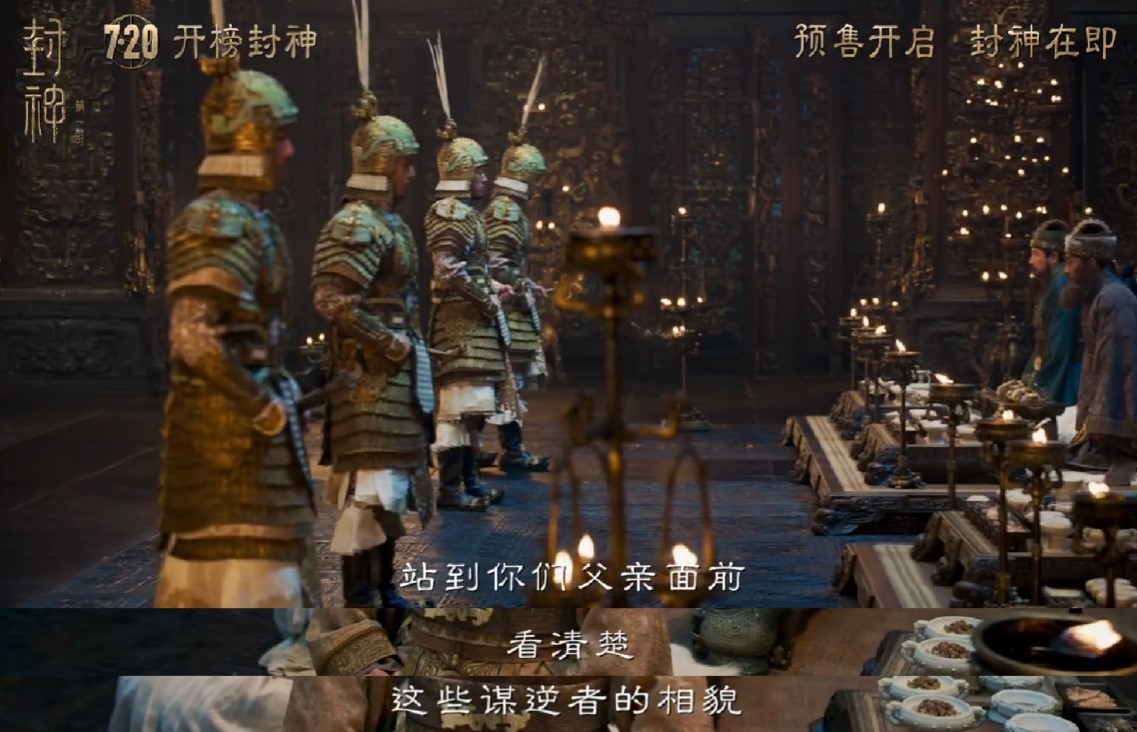
King Zhou asked the protons to "kill their fathers"
This is the peak manifestation of King Zhou's brutality, and it is also the key to his "death". In his view, if the protons can kill their biological father because of the order of his "spiritual father", this is a manifestation of loyalty. But he didn't realize the danger of doing so. In ancient times, loyalty and filial piety were one. When King Zhou destroyed the human relationship between father and son, he was actually destroying the ethics of monarch and ministers.
Feudal society is the same structure of the family and the country. The king is the king of the world and the "father" of the world. The monarch and his subjects are also a "father and son" relationship. Loyalty and filial piety are the most basic principles of ethics, and loyalty and filial piety are integrated. Filial piety is the premise of loyalty. It is written in the "Book of Filial Piety" that "serving the king with filial piety is loyalty." ". Feudal rulers have always attached great importance to filial piety and used "transferring filial piety as loyalty" as a ruling method.
Naturally, if loyalty and filial piety are to be integrated, conflicts between loyalty and filial piety must be avoided as much as possible. The ancients have already asked today's question "Who should be rescued first when my wife and mother fall into the water". For example, Cao Pi once asked the guests: "Each father has a serious illness. If there is a pill that can save one person, should he save Jun Xie? Father Xie?"
"The First Part of Fengshen" reasonably demonstrates why King Wu defeated Zhou from the thinking of "ancient people" rather than the "taken for granted" of modern people. Because King Zhou deconstructed "filial piety", in order to destroy the four great uncles and test the loyalty of the protons, he even asked the protons to kill their biological fathers with their own hands. Once filial piety can be wiped out, it means that the foundation of the three cardinal guides and five constant principles will collapse, so what is the need to stick to "loyalty"?
The film focuses on the choices of two young people, Yin Jiao and Ji Fa, and lays out the process of the disintegration of "loyalty" convincingly. Yin Jiao is the son of King Zhou, and also his subject. He has no heart for King Zhou, and he can die for King Zhou. Even if his biological mother, Empress Jiang, was killed by Su Daji, King Zhou remained indifferent. He only thought that his father Bewitched by the vixen, his father is still a "good man". After discovering that King Zhou knew that Su Daji was possessed by a fox demon, the desperate Yin Jiao shouted that he would return his life to his father, and planned to commit suicide by throwing himself against the pillar. In other words, even at this time, he didn't even have the idea of "anti". It wasn't until King Zhou was about to execute him, and before he was beheaded, that he tore up the way of father and son for the first time, and he swore that he would never let King Zhou go even if he died.
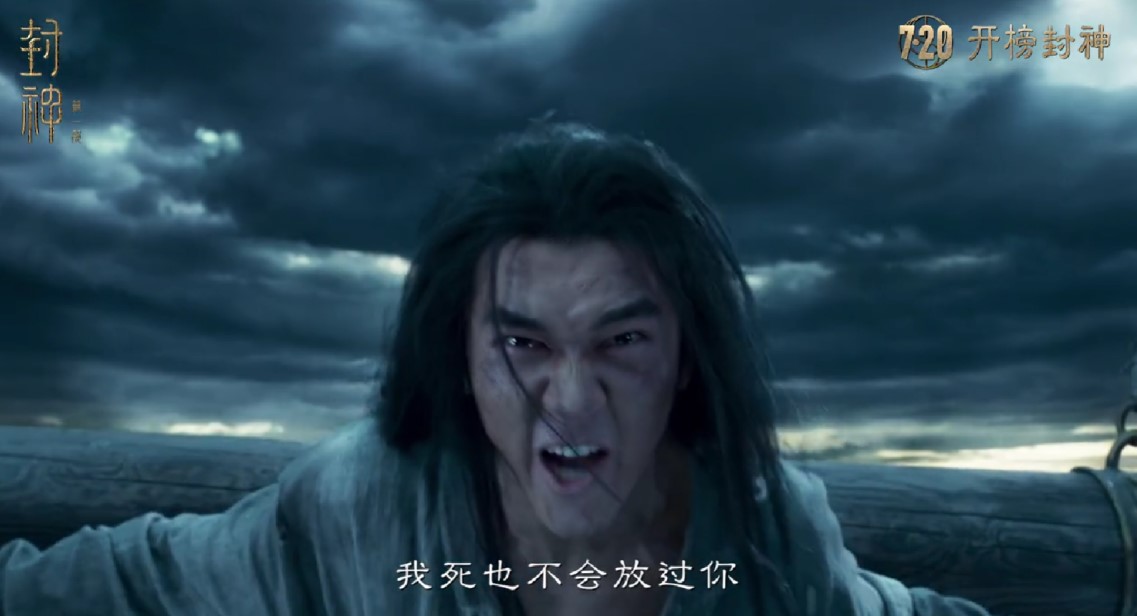
Yin Jiao (played by Chen Muchi)
Yinjiao's painful and long road to resistance shows how difficult it was for the ancients to make the decision of "subject to defeat the emperor". He has the universality of the times.
The portrayal of Ji Fa in the script, on the one hand, is to demonstrate the motives of his rebellion—King Zhou destroyed filial piety, killed his elder brother, and abused his father; on the other hand, it embodies the connotation of "modernity". Instead of exalting "filial piety", it rejects "foolish filial piety" and highlights the key power of individual choice. This is reflected in the key dialogue between Ji Chang and Ji Fa in prison in the movie. When Ji Fa said, "I am your son", Ji Chang told him, "It doesn't matter whose son you are, who you are is." important."
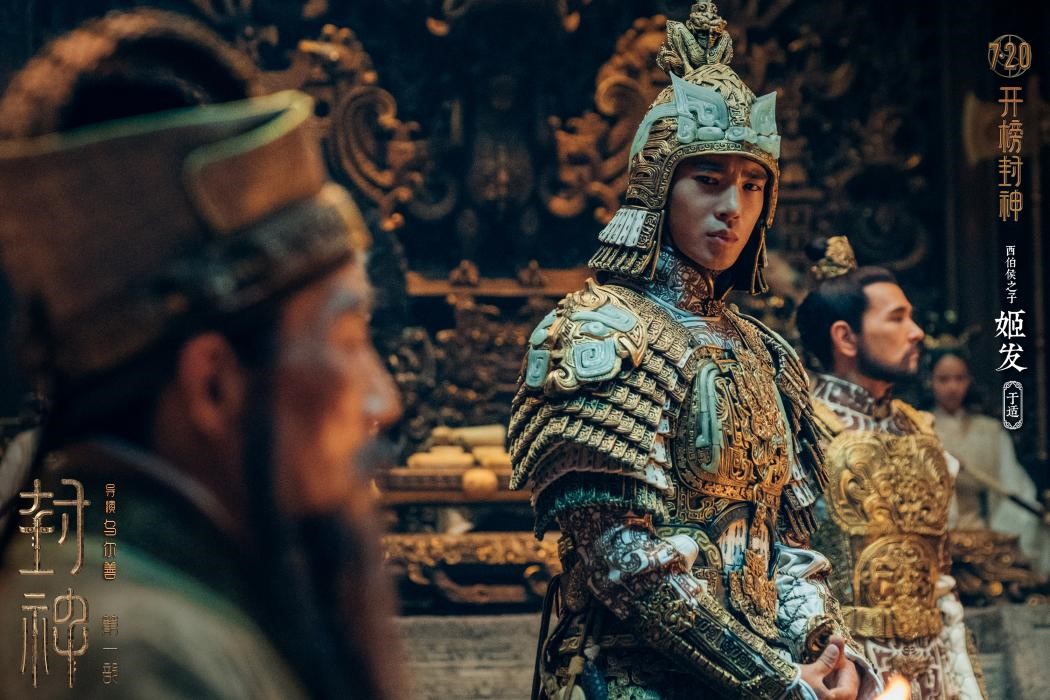
Ji Fa (played by Yu Shi) is between the two "fathers", and his road to awakening runs through the whole movie
This is the adaptation of real "modernity". It does not ask the ancients with the thinking of modern people, let the ancients pull your own hair to leave the earth, so the movie does not portray Su Daji as a "modern woman", nor does it lazily introduce the motives of King Wu's attack from the perspective of modern people On this basis, it can re-interpret this ancient myth and legend from the perspective of modern people in a reasonable and consistent manner. Fall into the trap of "foolish filial piety" and use it to highlight the individual choices of young people-it doesn't matter what kind of identity you have, and it doesn't matter whose "son" you are, what matters is that you have to "identify the authenticity, choose good and evil" and choose the side that is true and the side that is good.
"The First Part of Fengshen" provides a very good idea for the "new story" of ancient Chinese myths and legends. It not only tells an ancient legend "authentic", but also makes it not appear to be in the 21st century today. "Obsolete". I hope that critics will not magnify some individual flaws in the script, and completely obliterate the important creation of the screenwriting team.


